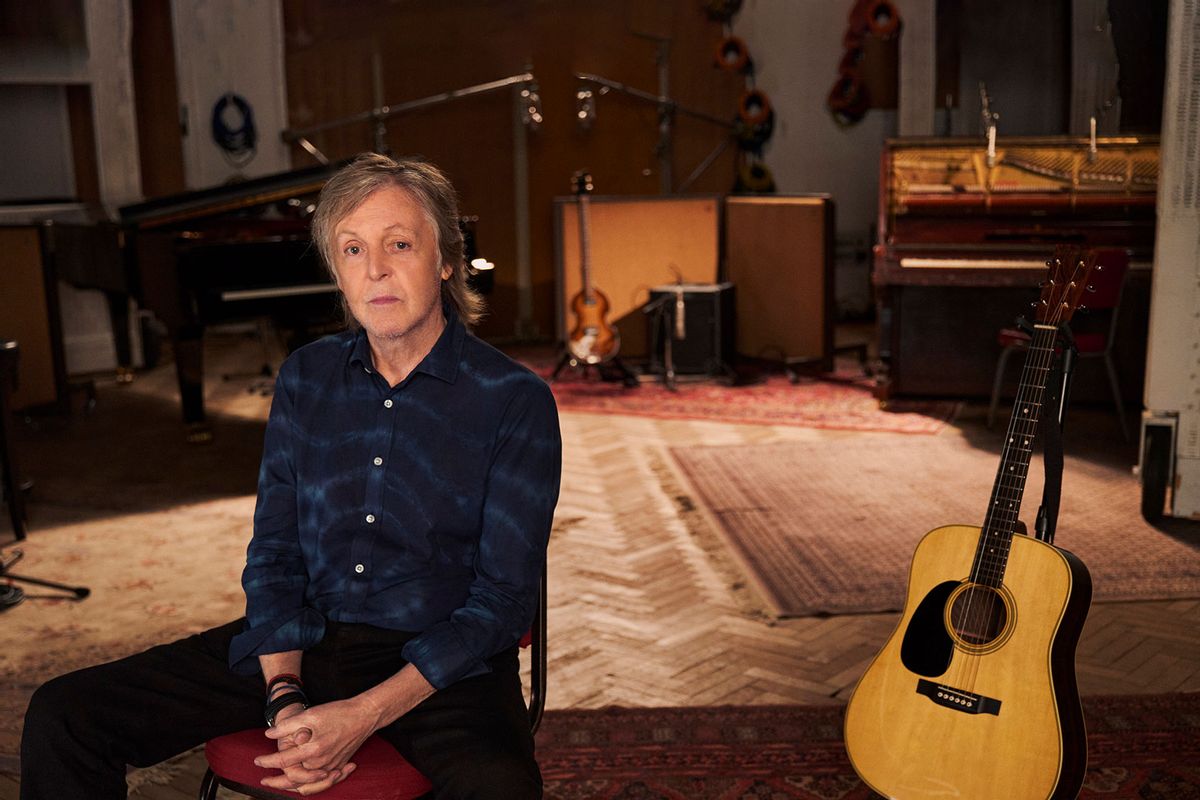Mary McCartney's documentary "If These Walls Could Sing" affords viewers with an unprecedented glimpse behind the gates of Abbey Road Studios. In a recent interview with me, McCartney provided insight into the documentary's genesis, as well as the musical magic that has been emanating from the studio across its remarkable 91-year history.
Pointedly, McCartney's film — streaming now on Disney+ — begins with early images of her parents Paul and Linda jamming with their band, Wings. When it comes to growing up with her famous father, Abbey Road has always connoted the notion of family for the documentarian, whose credits include "Mary McCartney Serves It Up," the hit cooking show in which she showcases vegetarian dishes in her London kitchen.
Abbey Road Studios has been part of McCartney's life for as long as she can remember. Located mere blocks away from her family's Northwest London home, the legendary recording studio has served as the launching pad for many of her father's most memorable recordings, Beatles and post-Beatles alike.
"If These Walls Could Sing" finds its origins in McCartney's interest in learning more about the famous studio and the tremendous pull that it exerts upon generation after generation of music lovers. "People come from all over the world to write messages on the wall," she told me, "and it feels like a real pilgrimage. It's not just a tourist thing," she adds. "It's a place where people congregate, a place that is very meaningful to them." With the documentary, she points out, her fondest dream is to help viewers understand "why it's such a historic place that has inspired so many people."
"It feels like a real pilgrimage. It's not just a tourist thing."
To bring her film to life, McCartney takes viewers on a journey back to November 1931, when composer Edward Elgar conducted the London Symphony Orchestra, including a performance of Land of Hope and Glory, which featured his time-eclipsing march "Pomp and Circumstance." As the documentary unfolds, McCartney highlights decades of musical achievements that came into being at Abbey Road, including classic albums by the Beatles and Pink Floyd.
In an especially powerful sequence, McCartney focuses her lens on the tragically brief, albeit profound career of cellist Jacqueline du Pré, who recorded many of her most celebrated works within the studio's hallowed halls. For McCartney, the story of du Pré's life, which was cut short by multiple sclerosis, makes for the documentary's "most poignant, sad moments."
But to McCartney's credit, the sequence also proves to be life-affirming, as the director shares vivid images of the kinetic cellist, who's "got this amazing long blond hair. She bounces around as she plays her cello. You've never seen anything like it. Her face is vibrant, and she's smiling, and the instrument becomes part of her body. It's incredible to watch her play."
These images are powerfully contrasted with du Pré's final visit to Abbey Road, when her illness has taken hold of her and sapped her previously unquenchable energy. The difference is simply heartbreaking. The scene brims with "depth and emotion," McCartney said. "She was such a vibrant talent."
Ultimately, McCartney points out, Abbey Road finds its power in the people who have worked in the studio. "They're like family," she says, "very, very talented technicians, some of the best in the world."
"There was talk of turning Studio 1 into a carpark or even tearing it down."
In one of the documentary's funniest moments, her father Paul notes that at Abbey Road, "all the microphones work," thanks to the painstaking care of studio staffers like Lester Smith.
In many ways, McCartney observes, the studio techs act as "innovative, brilliant collaborators with the musicians."
Love the Beatles? Listen to Ken's podcast "Everything Fab Four."
As we concluded our conversation, McCartney made special note of folks like Ken Townsend, the beloved studio head who deftly oversaw the facility's name change from EMI Recording Studios to Abbey Road in 1976. In so doing, he not only capitalized on the title of the Beatles' final recorded album but also ushered in a new era of entrepreneurialism in the studio's history that persists into the present day.
And this spirit of innovation proved to be the studio's saving grace. In the early 1980s, as EMI teetered on bankruptcy and the studio's fate seemed to be in jeopardy, it was Townsend, McCartney remarks, who pivoted towards soundtrack recording. "Things were getting quite desperate," she says. "There was talk of turning Studio 1 into a carpark or even tearing it down."
In the nick of time, Townsend fitted cavernous Studio 1 out with a screen and a projector to assist in recording film scores. The studio's resurgence began with "Raiders of the Lost Ark," followed by films in such lucrative franchises as the "Harry Potter" novels and "The Lord of the Rings" trilogy. In many ways, Townsend's deft effort to court new clients among the world's filmmakers made all the difference.
Read more
from Kenneth Womack about the McCartneys



Shares